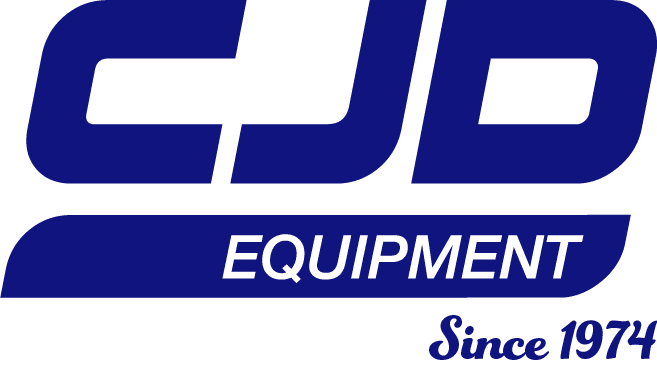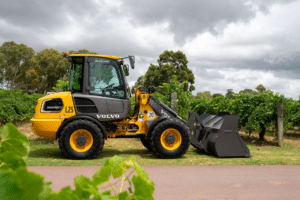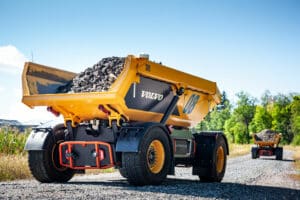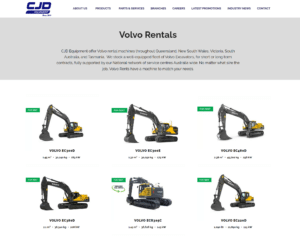The construction equipment industry is on the brink of a significant transformation. As we step into the next decade, new trends and technologies are poised to revolutionise how we build. These advancements can enhance construction site safety, efficiency, and sustainability from alternative power solutions to autonomous machinery. In this article, we will explore the top trends that will shape the future of the construction equipment industry in the next decade.
Increased Regulation of Carbon-based Fuels Spurs Adoption of Alternative Power Solutions
With growing concerns over climate change and greenhouse gas emissions, the construction equipment industry is experiencing a significant push towards adopting alternative power solutions. Volvo CE has partnered with CRH to focus on electrification, charging infrastructure, low-carbon fuels, and renewable energy. This collaboration aims to accelerate decarbonisation and achieve impactful change through collective efforts.
Volvo CE has set ambitious goals to reach net zero value chain greenhouse gas emissions by 2040. To achieve this, they have developed a CO₂ Reduction Program that helps customers realise their own unique goals towards CO₂ neutrality. The construction equipment industry can contribute to a greener and more sustainable future by embracing alternative power solutions.
Renewable Energy Production Booms
Renewable energy is experiencing a significant surge, with a 42% increase in the United States from 2010 to 2020. Major corporations, including Volvo CE, have invested in renewable energy sources such as biofuels, solar, and wind power. CJD Equipment, the Australian distributor of Volvo CE, is also committed to a sustainable future and is introducing a range of compact electric machines to Australia. This includes electric excavators and wheel loaders, which align with the growing demand for sustainable construction practices.
Adopting renewable energy in the construction equipment industry reduces carbon emissions and contributes to a more environmentally friendly approach to building. By harnessing the power of renewable energy sources, construction companies can reduce their reliance on carbon-based fuels and make significant progress towards achieving a greener future.
Compact Equipment Trends: The Shift to Electric
The trend towards electrification is wider than large construction equipment. The shift towards electric compact equipment, such as skid steers, compact excavators, and compact loaders, is gaining momentum. CJD Equipment, the Australian distributor of Volvo CE, is at the forefront of this electrification trend. As part of its commitment to a sustainable future, CJD Equipment is introducing a range of compact electric machines to Australia, including the ECR18 and ECR25 Electric compact excavators and the L25 Electric wheel loaders.
Electric compact equipment offers several advantages, including reduced noise pollution, lower operating costs, and zero emissions at the point of use. This shift towards electric power in compact equipment aligns with sustainability goals and improves the overall efficiency and performance of construction sites.
Connectivity Leads to Jobsite Transformation
The construction equipment industry is transforming digitally thanks to advanced connectivity solutions. In partnership with Volvo CE, CJD Equipment is leveraging these connectivity solutions to optimise job flow and ensure efficient operations. One of the key initiatives in this regard is the introduction of Volvo’s Connected Map solution, which provides a visual overview of all machines and vehicles on the job site.
By leveraging advanced connectivity solutions, operators and site managers can optimise traffic flow, track equipment and personnel whereabouts, and promote smoother, safer, and more productive operations. Telematics and connected technologies, such as Volvo Co-Pilot, provide operators valuable insights into machine performance, fuel consumption, and maintenance.
These advanced connectivity solutions revolutionise how construction sites are managed, improving productivity, efficiency, and safety. By embracing connectivity, the construction equipment industry can unlock new levels of efficiency and streamline operations. What is Volvo’s CareTrack and ActiveCare Solutions?
Pathway Toward Autonomous Construction Equipment Machinery
The construction industry is on the cusp of a technological revolution with the adoption of autonomous machinery. While fully autonomous machines may not be ubiquitous in the next decade, the growing intelligence of these devices will play a pivotal role in enhancing efficiency, productivity, and fuel and energy efficiency.
Volvo CE is at the forefront of leading the pathway to autonomous machinery in the construction industry. They have been actively involved in developing autonomous heavy machinery, focusing on improving safety, uptime, and overall performance. The deployment of autonomous machinery has the potential to address the construction labour shortage by reducing the number of workers required on-site, thereby contributing to a safer and more streamlined construction environment.
Autonomous machinery offers several advantages, including increased productivity, improved safety, and reduced labour costs. By embracing these technologies, the construction equipment industry can enhance efficiency and productivity while ensuring a safer working environment.
Construction Equipment Sensors for Efficiency and Safety
The utilisation of advanced sensor technology in construction equipment is transforming the industry by enhancing efficiency and safety. Volvo CE is at the forefront of utilising these sensors to improve construction machinery performance and safety on construction sites.
Sensors play a pivotal role in improving safety, ranging from safety backup sensors for machinery to wearable devices that detect worker falls. Volvo CE can gather real-time data by leveraging internet-connected sensors, enabling better control and optimisation of construction sites. This enhanced connectivity and real-time visibility into machine performance and location allow for improved safety and efficiency, ultimately revolutionising how construction sites are managed.
These sensors are a significant step towards achieving Volvo CE’s vision of a world with zero accidents. By effectively consolidating and utilising the data from these sensors, Volvo CE is enhancing operations and sustainability, driving the industry towards a safer and more efficient future.
Workers with a Different Skillset
The construction industry faces a significant labour shortage, particularly as experienced workers retire. To address this challenge, technology is playing a crucial role in attracting and retaining the younger workforce. Generation Z, born after the mid-1990s, is more inclined towards remote and electronic work.
To appeal to this generation, the industry is adapting by using simulators and remote operation of machinery. These advanced technologies make the industry more attractive to younger workers, aligning with their preferences and expectations for a modern workplace. Additionally, deploying these technologies requires new skills, and the industry is actively working to ensure that the workforce is equipped with the necessary competencies to operate and manage these advanced systems.
By embracing technology and providing opportunities for continuous workplace training and lifelong learning, the construction industry aims to attract and retain the younger workforce, ensuring its long-term sustainability and success.
Construction Equipment Business Models Shift Toward Subscriptions
In the next decade, the construction industry is expected to witness a significant shift in business models, with Equipment as a Service (EaaS) emerging as a viable option. This innovative approach, offered by Volvo CE in partnership with CJD Equipment in Volvo Rents, allows contractors and construction companies to lease equipment for specific periods, providing access to the latest and most technologically advanced machinery without significant upfront investments.
This shift towards EaaS and other subscription-based models frees up time and budgets for fleet management. It ensures access to cutting-edge technology, ultimately enhancing the industry’s efficiency and productivity. EaaS enables customers to concentrate fully on their core business without worrying about the equipment that supports it, driving the industry towards a more sustainable and efficient future.
Construction Equipment Data: Unlocking its Value
The construction industry generates vast amounts of data, and Volvo CE is at the forefront of leveraging this data to provide valuable insights for planning and operations. Through their connected solutions, Volvo CE is revolutionising the industry by making robust data usable and shareable, enabling smarter, safer, and more sustainable work practices.
Volvo CE is digitalising construction processes by adopting digital technologies and data analytics to make them more efficient and sustainable. Their Product Lifecycle Management (PLM)-enabled digital thread facilitates collaborative working methods, laying the foundation for broader value across the organisation.
Volvo CE enhances operations and sustainability by effectively consolidating and utilising data, driving industry-wide progress. They offer tailored customer support to reach their carbon reduction goals, demonstrating their commitment to leveraging data and digital solutions to drive sustainability.
Cybersecurity: Ensuring Safe and Efficient Operations
As connectivity and automation increase on construction sites, the importance of cybersecurity cannot be overstated. In partnership with Macquarie Telecom, CJD Equipment has prioritised cybersecurity to protect its digital assets and ensure safe and efficient operations. They have invested in advanced cybersecurity measures, automating security with AI-driven SASE (Secure Access Service Edge) technology and SD-WAN (Software-Defined Wide Area Network).
CJD Equipment is committed to safeguarding its digital infrastructure and customer relationships by investing in cybersecurity. These measures contribute to a more secure and resilient construction industry, ensuring uninterrupted operations and protecting sensitive data.
In conclusion, the construction equipment industry is undergoing a remarkable transformation. These trends are reshaping how we build from alternative power solutions and renewable energy to autonomous machinery and advanced connectivity. The industry can drive future innovation, sustainability, and efficiency by embracing these advancements. With a focus on safety, productivity, and customer success, Volvo CE and its partners like CJD Equipment are leading the way in shaping the construction equipment industry in Australia and beyond.






